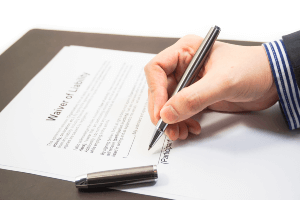 Theme parks, fitness centers and organizers of recreational activities like 5ks often require participants to sign liability waivers before participating. Companies use these documents to attempt to avoid liability for injuries or deaths that may occur.
Theme parks, fitness centers and organizers of recreational activities like 5ks often require participants to sign liability waivers before participating. Companies use these documents to attempt to avoid liability for injuries or deaths that may occur.
When you sign your name on one of these documents it may seem like you are signing away your rights. However, it may still be possible to file a lawsuit, even though you signed a liability waiver.
Below, the Brunswick personal injury lawyers discuss the importance of understanding your rights after suffering an injury, even if you signed a waiver of liability.
How Do Liability Waivers Work?
A liability waiver is a contract between a customer and a company that specifies the liability limits of that entity should a person using the company’s facilities or equipment be injured or killed.
These waivers are meant to provide protection for companies offering a service associated with certain risks of injury or death. Customers are frequently asked to sign liability waivers in places such as:
- Trampoline parks
- Amusement parks
- Sports and recreation leagues
- Recreational activity companies
- Gymnasiums and fitness centers
When Are Liability Waivers Enforceable?
Every entity or property owner has a duty of care to those using the property or equipment on the property. While the duty of care varies based on many factors, essentially, the property owner or other entity must take ordinary care to help prevent people from being injured. If there is an absence of ordinary care, it can be called negligence.
The state of Georgia only recognizes the enforceability of liability waivers that are well-written and deny liability for ordinary negligence, so long as they do not violate public policy.
Georgia courts stress that waivers may be considered unenforceable due to a violation of public policy. However, this only applies in cases free from doubt. The waiver must fit one of three criteria:
- It was declared to violate public policy by the Georgia General Assembly.
- It is in contravention, or violation, of the law.
- It is entered into for the purpose of effecting an illegal or immoral agreement.
Another factor to consider when determining the validity of a liability waiver is who signed the waiver.
There is legal precedent that has established that a liability waiver may only be enforced if the person who signed it was of sound mind and did not do so under duress. This means someone who was pressured or coerced into signing a waiver would not be barred from taking legal action against a person or entity that caused his or her injury.
Parents and legal guardians who sign liability waivers on behalf of minors or dependent adults have the legal right to do so. However, it has also been established that dependents have legal rights that may not be waived without court approval under certain circumstances.
Liability Waivers and Negligence
Because state law in Georgia only upholds liability waivers that deny ordinary negligence, it is important to note that an injury caused by slight or gross negligence may give the victim grounds for legal action against a person or entity, even if the injury victim signed a liability waiver.
Slight negligence in Georgia is defined as the absence of extraordinary diligence which is when extreme care and cautionary measures are taken by a prudent and thoughtful person under the same or similar circumstances. For example, an amusement park failing to post warning signs on a ride for people who suffer from high blood pressure or heart problems.
When an injury is caused by gross negligence, it can be said a person or entity failed to act with slight diligence in the degree of care to which every man of common sense, however inattentive he may be, would in a similar circumstance. A company that rents equipment to tourists and fails to keep that equipment in proper working order may have engaged in gross negligence.
Injured After Signing a Waiver? Call Today
If you signed a liability waiver, it is in your best interest to speak to a licensed attorney with extensive knowledge of the law and experience recovering compensation for injuries that happened on another’s premises.
Roden Law has secured millions on behalf of our clients, including a $3.35 million verdict in a premises liability case.
We offer a free consultation and do not charge any fees while we work on your case. Our attorneys are not paid unless you get paid.
